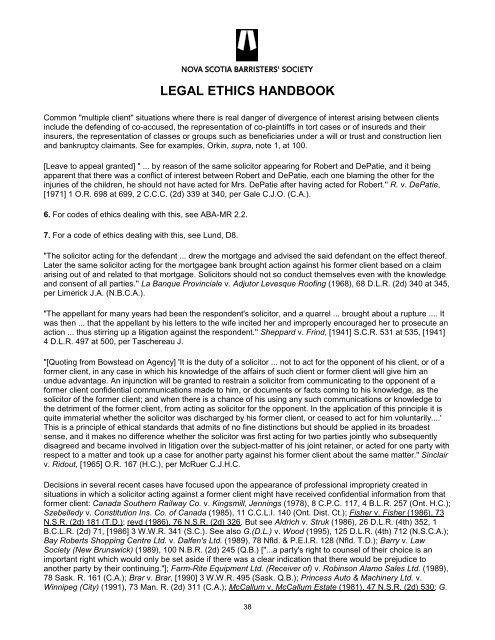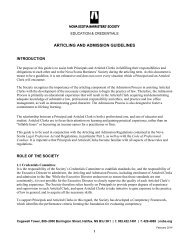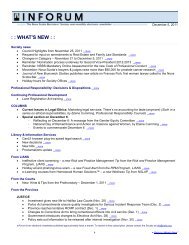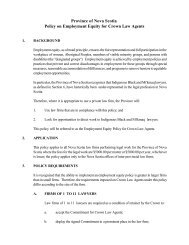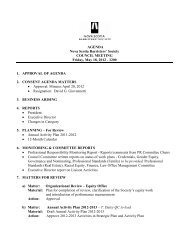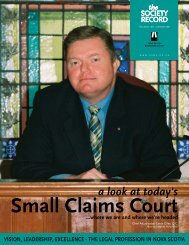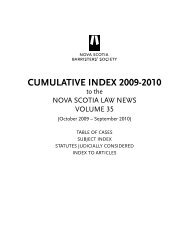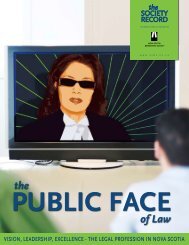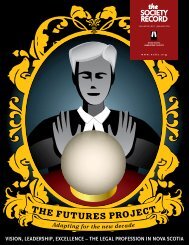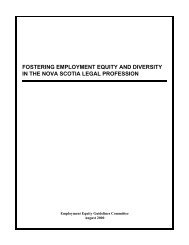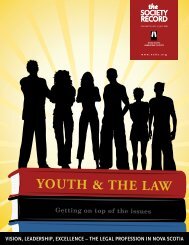legal ethics handbook - Nova Scotia Barristers' Society
legal ethics handbook - Nova Scotia Barristers' Society
legal ethics handbook - Nova Scotia Barristers' Society
Create successful ePaper yourself
Turn your PDF publications into a flip-book with our unique Google optimized e-Paper software.
LEGAL ETHICS HANDBOOK<br />
Common "multiple client'' situations where there is real danger of divergence of interest arising between clients<br />
include the defending of co-accused, the representation of co-plaintiffs in tort cases or of insureds and their<br />
insurers, the representation of classes or groups such as beneficiaries under a will or trust and construction lien<br />
and bankruptcy claimants. See for examples, Orkin, supra, note 1, at 100.<br />
[Leave to appeal granted] " ... by reason of the same solicitor appearing for Robert and DePatie, and it being<br />
apparent that there was a conflict of interest between Robert and DePatie, each one blaming the other for the<br />
injuries of the children, he should not have acted for Mrs. DePatie after having acted for Robert.'' R. v. DePatie,<br />
[1971] 1 O.R. 698 at 699, 2 C.C.C. (2d) 339 at 340, per Gale C.J.O. (C.A.).<br />
6. For codes of <strong>ethics</strong> dealing with this, see ABA-MR 2.2.<br />
7. For a code of <strong>ethics</strong> dealing with this, see Lund, D8.<br />
"The solicitor acting for the defendant ... drew the mortgage and advised the said defendant on the effect thereof.<br />
Later the same solicitor acting for the mortgagee bank brought action against his former client based on a claim<br />
arising out of and related to that mortgage. Solicitors should not so conduct themselves even with the knowledge<br />
and consent of all parties.'' La Banque Provinciale v. Adjutor Levesque Roofing (1968), 68 D.L.R. (2d) 340 at 345,<br />
per Limerick J.A. (N.B.C.A.).<br />
"The appellant for many years had been the respondent's solicitor, and a quarrel ... brought about a rupture .... It<br />
was then ... that the appellant by his letters to the wife incited her and improperly encouraged her to prosecute an<br />
action ... thus stirring up a litigation against the respondent.'' Sheppard v. Frind, [1941] S.C.R. 531 at 535, [1941]<br />
4 D.L.R. 497 at 500, per Taschereau J.<br />
"[Quoting from Bowstead on Agency] 'It is the duty of a solicitor ... not to act for the opponent of his client, or of a<br />
former client, in any case in which his knowledge of the affairs of such client or former client will give him an<br />
undue advantage. An injunction will be granted to restrain a solicitor from communicating to the opponent of a<br />
former client confidential communications made to him, or documents or facts coming to his knowledge, as the<br />
solicitor of the former client; and when there is a chance of his using any such communications or knowledge to<br />
the detriment of the former client, from acting as solicitor for the opponent. In the application of this principle it is<br />
quite immaterial whether the solicitor was discharged by his former client, or ceased to act for him voluntarily....'<br />
This is a principle of ethical standards that admits of no fine distinctions but should be applied in its broadest<br />
sense, and it makes no difference whether the solicitor was first acting for two parties jointly who subsequently<br />
disagreed and became involved in litigation over the subject-matter of his joint retainer, or acted for one party with<br />
respect to a matter and took up a case for another party against his former client about the same matter." Sinclair<br />
v. Ridout, [1965] O.R. 167 (H.C.), per McRuer C.J.H.C.<br />
Decisions in several recent cases have focused upon the appearance of professional impropriety created in<br />
situations in which a solicitor acting against a former client might have received confidential information from that<br />
former client: Canada Southern Railway Co. v. Kingsmill, Jennings (1978), 8 C.P.C. 117, 4 B.L.R. 257 (Ont. H.C.);<br />
Szebelledy v. Constitution Ins. Co. of Canada (1985), 11 C.C.L.I. 140 (Ont. Dist. Ct.); Fisher v. Fisher (1986), 73<br />
N.S.R. (2d) 181 (T.D.); revd (1986), 76 N.S.R. (2d) 326. But see Aldrich v. Struk (1986), 26 D.L.R. (4th) 352, 1<br />
B.C.L.R. (2d) 71, [1986] 3 W.W.R. 341 (S.C.). See also G.(D.L.) v. Wood (1995), 125 D.L.R. (4th) 712 (N.S.C.A.);<br />
Bay Roberts Shopping Centre Ltd. v. Dalfen's Ltd. (1989), 78 Nfld. & P.E.I.R. 128 (Nfld. T.D.); Barry v. Law<br />
<strong>Society</strong> (New Brunswick) (1989), 100 N.B.R. (2d) 245 (Q.B.) ["...a party's right to counsel of their choice is an<br />
important right which would only be set aside if there was a clear indication that there would be prejudice to<br />
another party by their continuing."]; Farm-Rite Equipment Ltd. (Receiver of) v. Robinson Alamo Sales Ltd. (1989),<br />
78 Sask. R. 161 (C.A.); Brar v. Brar, [1990] 3 W.W.R. 495 (Sask. Q.B.); Princess Auto & Machinery Ltd. v.<br />
Winnipeg (City) (1991), 73 Man. R. (2d) 311 (C.A.); McCallum v. McCallum Estate (1981), 47 N.S.R. (2d) 530; G.<br />
38


